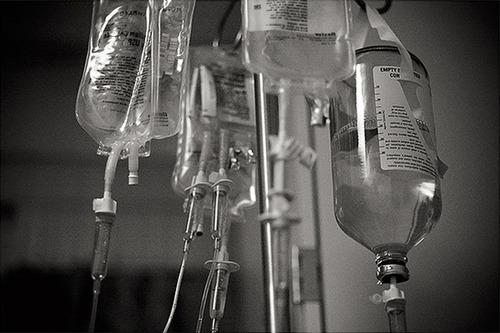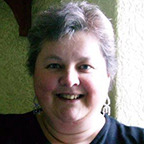
Photograph ©_honus_ on flickr
By Kaz Molloy
As a womb cancer survivor I endured surgery, chemotherapy and then radiotherapy – often referred to as the slash, poison and burn approach to dealing with cancer.
Over the past few decades there have been many advances in detecting cancers early but the standard approaches to treatment remain mostly unchanged. In some cases the treatment regime has been the same for decades, leaving patients at the mercy of sometimes ineffective and often barbaric treatments.
Routine chemotherapy for womb cancer is a very recent innovation in the NHS as studies have shown that 1 in 10 women will be helped by chemo – so it is definitely worth trying. But maybe an individual assay of each patient’s tumour might be able to detect which tumours will be susceptible to chemotherapy and which tumours won’t. This would spare 9 out of 10 patients (and their families) a seriously distressing treatment programme.
We are now in the 21st century and yet innovation in the treatment of most cancers has not progressed because of the failure of the NHS medical establishment to try anything new. Many doctors are afraid to try new procedures because of the risk of being sued if something goes wrong.
The Saatchi Bill seeks to bring about a change in the law to protect doctors and allow them to push forward with innovation in new treatments, which is something that we all want.
As far as womb cancer is concerned, although it is often classed as a rarer cancer, it is still a cancer with a relatively good survival rate, if detected early. It is predominantly a cancer of post menopausal women, although in recent years there have been more and more younger women being diagnosed. However, when they present at their GP with all the typical womb cancer symptoms, they are often told they are too young to have womb cancer so the chance of early detection is missed.
We at Womb Cancer Support UK would like GP’s to take our symptoms more seriously. Most of us had problems with heavy bleeding, fibroids, polyps etc. for many years prior to diagnosis. Some of us have had polycystic ovary syndrome or have Lynch Syndrome in our families.
Womb cancer, like cervical cancer, commonly goes through a well-known pre-cancerous stage known as EIN : Endometrial Intraepithelial Neoplasia (Abnormal thickening of the womb lining). Statistically a woman with EIN is according to one researcher 45 times more likely than a woman without EIN to develop womb cancer.
Of course until there are definite biomarkers for EIN and womb cancer, it seems sensible to give at risk women a far better chance of earlier diagnosis of womb cancer. Surely it would make sense that if a woman is presenting at her GP with severe heavy bleeding, that she be monitored to see if she has EIN and if it increases or decreases.
The issue of younger women being diagnosed with womb cancer also brings up the fertility issue. At present many young women are being denied the chance of motherhood because of the pressure to have an immediate hysterectomy and/or cancer treatment. We would like to see all women of child bearing age being given details of all options available to them. In the case of early stage cancer it is sometimes possible for a woman to go ahead with a pregnancy before any treatment commences.
Of course, what we at Womb Cancer Support UK would really like to see is more research done into the causes of womb cancer which will then hopefully lead to a simple screening test.
Some of the recent media reports about women getting womb cancer because they drank too many sugary drinks; drank too much/not enough coffee; don’t get enough exercise; are too fat; etc. are not helping to raise awareness. They are simply trying to blame the patient for getting cancer. I know of women who have never drunk sugary drinks, who ran marathons and are/were far from being obese yet they still got womb cancer.
The blame game has to stop. Instead we need proper research to find out the causes of womb cancer. GPs need to focus not on stereotypes, which can be misleading, but on symptoms, which are very clear. To be fair to GPs, they need rapid access to diagnostic tests. It’s not rocket science that when symptomatic patients have direct access to specialists they are diagnosed with cancer at a much earlier stage.
And just as one-size-fits-all cancer treatment isn’t suitable for every individual patient, neither is the NHS standard test for womb cancer: one-size-fits-all quick, cheap and nasty outpatient hysteroscopy/biopsy with no pain-relief. This test may be well tolerated by some fortunately tough patients but may prove a nightmare and a deterrent for other patients.
Womb Cancer Support UK (WCSUK) started out in April 2011 as an online support group for women who had or had had a womb cancer diagnosis. It soon became apparent that there was very little awareness of womb cancer so we try to raise awareness of the signs and symptoms as well as offering support and advice to women who have been diagnosed.
About the author:

Kaz Molloy, founder of Womb Cancer Support UK, was diagnosed with womb cancer at the end of 2009. After treatment which involved surgery, chemotherapy and radiotherapy she became aware of a lack of dedicated support for women with womb cancer so set up an online support group in April 2011.
They now raise awareness of womb cancer as well as continuing to offer support and advice.
Kaz is married and lives on Isle of Bute, off the west coast of Scotland.
http://wombcancersupportuk.weebly.com/